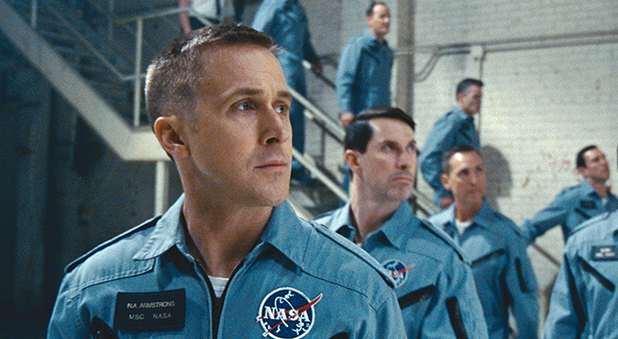Hollywood has created numerous major films about the space race – think The Right Stuff, Apollo 13 and, more recently, Hidden Figures. But if you’re thinking that with these films you’ve been there and seen that, First Man might make you think again.
Each “space” film shows a different perspective of the hard slog, the smarts, the strength and the cost that was involved in getting to the moon. First Man does it from the perspective of Neil Armstrong (Ryan Gosling), and there’s precious little flag waving or hoopla. It’s a reflective – almost introspective – and deeply personal account of the eight years in Armstrong’s life that led up to the successful Apollo 11 mission in July 1969.
What, after all, do we know about Neil Armstrong? If you’re anything like me, you know he was the first man to walk on the moon (hence the title), and you know the famous line he spoke as he did so.
After that, it’s a blank. A little digging and you discover he was an engineer and the first civilian chosen for the space program. He was also an intensely private man who kept resolutely out of the spotlight – at least, as much as he was allowed to – which probably explains why there’s so very little in the public memory about him.
Christians in space?
Depending on which stories you believe, Armstrong was a Christian, an atheist, converted to Islam on the moon, became a recluse after the moon mission, never signed autographs, etc etc. Naturally, none of these things are true, but that doesn’t stop them being repeated. As a young man he described himself as a “deist”. And he felt privileged to walk in Jesus’ footsteps when he visited Jerusalem. But that’s about it.
Other US astronauts were believers before they blasted off, or did come to faith as a result of what they experienced in space. Armstrong’s fellow moonwalker Buzz Aldrin brought bread a wine to the moon and celebrated communion. Armstrong did not join in. Frank Borman, the commander of Apollo 8 – the first mission to fly around the moon – looked down on his planet and quoted Genesis 1: “In the beginning, God created the heavens and the earth.”
But as much as First Man shows the majesty of God’s creation as seen through the eyes of ordinary mortals, that’s not what it’s about. We’re focused on human effort plus the yawning gaps of knowledge about Armstrong as a man.
/cdn.vox-cdn.com/uploads/chorus_image/image/61343679/2493_D030_00395R_GRD.JPG_cmyk_2040.0.jpg)
Harsh reality
The film opens with a hair-raising experience in a test aircraft piloted by Armstrong, which will have you clutching the arms of your chair. Then we’re brought back to earth with a thud as the Armstrongs are faced with the impending death of their little girl from cancer. One public moment, and one that’s very private.
Armstrong is hurting but keeps it to himself and stoically goes back to work. We see his daughter throughout the rest of the film in his mind and memory, and the filmmakers strongly suggest her death was the impetus for him to apply for the space program. Who knows. More likely, as his wife Janet (Claire Foy) says, “It’s a fresh start”.
Either way, they’re off to Houston and there are gruelling years ahead of training and struggle, danger and death as NASA attempts to conquer space. Not for altruistic reasons, and certainly not for the exploratory and scientific advances that motivated Armstrong. In the end, frankly, it was all about beating the Russians.
There are lighthearted moments with family and friends, and we see the bonds that develop in the wider NASA community, but we’re never allowed to forget what’s at stake.
The overarching sentiment is that This Is Serious. And it is, but it does make the action a little self-conscious at times. However, the performances are absorbing and the script uncluttered, so viewers can engage fully with what’s onscreen. It also helps that there’s a focus on some lesser-known parts of the space “story” – including the potential statement that was readied for release just in case the Apollo 11 mission went horribly wrong. Now there’s a sobering thought.
The film omits the moment that Neil Armstrong planted the US flag on the moon, which caused a lot of fuss in some circles. Frankly, I’m grateful for some subtlety from the filmmakers at this point. Rather than “U-S-A” rah-rah they’ve concentrated on other things, and we still do see the flag in the distance near the lunar module. We also don’t get to see the astronauts’ return trip to Earth, but it’s not like it didn’t happen!
The cost of human achievement
First Man glories in human achievement, but it’s also clear this comes at a price. Rational fear, sorrow and even care for relationships must be put aside because nothing is more important than getting the job done. And despite the space program’s eventual success, that’s pretty tragic. Especially when you add to it the knowledge that, of all the families involved in the space program around this time, many were shattered along the way by the deaths of astronauts and only a handful of marriages survived. We got to the moon, yes, but was it really worth the collateral damage?
The ensemble cast is excellent throughout, particularly Claire Foy as the no-nonsense Janet Armstrong, but it’s Ryan Gosling who carries the film. A reserved but strong presence, he makes you believe that Neil Armstrong was every bit as valuable as NASA thought him. He says as much with a look or a moment of stillness as he does with his words, and while we get a few too many facial close-ups during dramatic moments, he is utterly believable and you’re with him to the end.




















